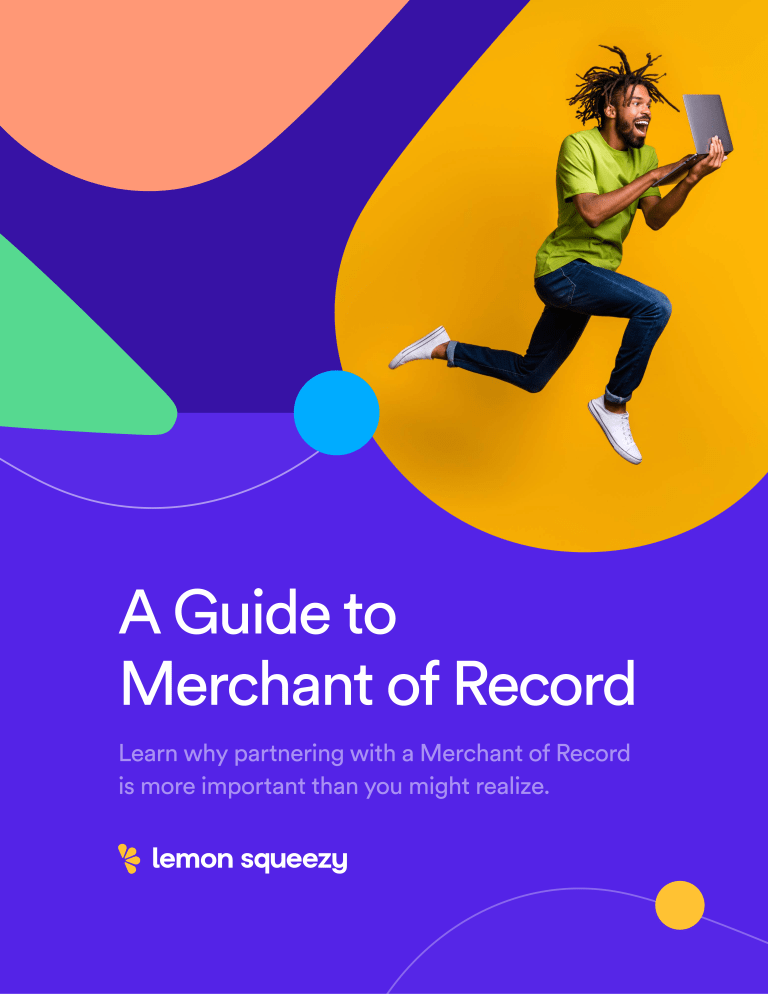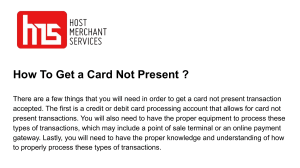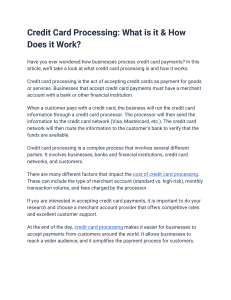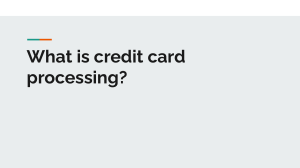
A Guide to Merchant of Record Learn why partnering with a Merchant of Record is more important than you might realize. 1 Table of contents 2 Introduction 3 What is a Merchant of Record? 6 Who benefits from a Merchant of Record? 9 The benefits of partnering with an Merchant of Record 11 How does a Merchant of Record actually work? 13 What a Merchant of Record does for clients 16 Comparing costs: Stripe vs Lemon Squeezy fees 18 Choosing a Merchant of Record and Lemon Squeezy Meet the author. This MoR guide was created by JR Farr, CEO and Co-Founder of Lemon Squeezy — a global payments and Merchant of Record platform. lemonsqueezy.com Introduction 2 Introduction Most SaaS companies are breaking international tax laws without even knowing. If that has you breaking out in a cold sweat, you’re not alone. When you’re building a product, you’re excited about putting it out there, getting new customers, and making it the best product it can be. You’re not thinking about boring tax regulations in a country on the other side of the world. But ignoring legal etiquette can leave you in a sticky situation. Here’s the thing: when you sell products online, there are two ways you can take payment: 1. Through a hosted gateway - A hosted gateway acts as a third-party and takes payment through your website. It absorbs the risk of being the MoR–but here’s the catch: it’ll cost you. 2. Via a non-hosted method - Alternatively, you can be the payment processor for your website. But this means you will be the MoR–here’s the catch: you need to comply with the relevant laws in the countries you’re selling your product (which, if it’s digital in any capacity, will probably be a lot of countries). If you sell digital products to a global audience, chances are you’ll benefit from an MoR. This guide will outline exactly what that means and how a simple partnership can change your business. 3 Part one What is a Merchant of Record? What is a Merchant of Record? What exactly is a Merchant of Record? A merchant of record is a legal entity that sells goods or services to the end customer. It handles all payments and absorbs tax and legal liabilities for each transaction. In short, a merchant of record handles your online payments, tax collection, tax remittance, tax compliance, fraud prevention, and liability. Basically, it stops you from breaking international tax laws like all those other SaaS brands. The key things an MoR does for you The great thing about MoR entities is they process all payments as well as take on the liability for those transactions. This includes: Registering, filing, and paying taxes in each country Collecting overall tax and VAT Handling refunds and chargebacks Preventing fraud Managing PCI compliance This means you don’t have to handle these activities in your own location or any location that you sell in. 4 What is a Merchant of Record? 5 Who can be a merchant of record? 1. Companies - You can be your own MoR, but this means you’re responsible for processing all payments and taking on all liabilities for those transactions regardless of where you’re selling your products. 2. Third-party MoR - Alternatively, you can outsource the work of an MoR to a third-party company that will process payments and becomes liable for ensuring you’re meeting tax and payment regulations in each market. What is the difference between a merchant of record and a payment service provider? Merchant of record? Seller of record? Payment service provider (PSP)? Do all these buzzwords refer to the same thing? In short, no. An MoR handles the entire order process from start to finish and takes on all related liabilities in whichever markets you choose to sell in. A payment service provider just handles the transaction part. They make sure money is successfully taken from a buyer and deposited in your bank account. Nothing more, nothing less. Finally, you might also have seen the phrase “seller of record” doing the rounds, which is a term more closely related to an MoR. It’s essentially the legal entity referred to and identified as the seller of a product. 6 Part two Who benefits from a Merchant of Record? Who benefits from a Merchant of Record? 7 Some businesses are better suited to an MoR than others because they either have a global audience by default or because they sell products that have different rules and regulations in different parts of the world. Here are the types of brands that might benefit the most from partnering directly with an MoR: SaaS Brands Software as a service companies tend to have a global audience since their product primarily lives online and can be easily accessed by anyone and everyone. This can make payments, billing and taxes tricky with a global audience. An MoR helps streamline payments and ensure the right taxes are assigned to the right users. eCommerce brands Globalization has made it possible for ecommerce brands to sell across borders. While this means they can reach a much bigger audience, it also means they’re selling across state lines or internationally without local bank accounts and other official entities. An MoR makes sure the brand is paying the right taxes and adhering to the right rules in the countries its customers are from. Brands selling digital products Digital products, including ebooks, whitepapers, workshops, and courses can target anyone, anywhere. On top of this, different countries have different rules for paying taxes on digital downloads, which can get complicated quickly without an MoR to streamline payments and taxes. Most brands that serve an international audience will benefit in some way from an MoR–even if it’s simply to display the local currency and payment options for customers in different parts of the world. Who benefits from a Merchant of Record? Why you should partner with a Merchant of Record When you are the MoR, you are liable for every single payment. You have to resolve any issues that crop up and take on financial responsibilities like: Maintaining a merchant account Negotiating processing fees Making sure you’re compliant with PCI-DSS standards Maintaining compliance with local payment laws Managing tax calculations Managing refunds and chargebacks It’s a lot, and it takes time away from the stuff you enjoy, like creating an amazing product and serving your customers. 8 9 Part three The benefits of partnering with a Merchant of Record The benefits of partnering with a Merchant of Record 10 Ultimately there are countless reasons why someone would partner with a Merchant of Record. Here are some of the most compelling and important benefits that come when working with a Merchant of Record ... Keep control of your products Maintain full control over your business without the tax hassle. You remain in control of your products, website, emails, brand, terms, and privacy policy. Accept immediate payments Immediately accept payments legally. Take payments from audience and get paid quickly wherever your customers are in the world. Handle customers from anywhere Attract users from all over the world without worry: Create a slick customer experience for customers wherever they live. Accept global currencies Show prices in a user’s local currency: Build trust with international customers by showing prices in their local currency and offering their preferred payment methods. Prevent fraud Sleep easy with built-in fraud prevention: Reduce the amount of fraud by quickly identifying potential scammers. Stay ahead of rule changes Stay on top of constantly changing rules. Tax regulations change often, and it’s near-on impossible to stay on top of the changes happening in different countries. 11 Part four How does a Merchant of Record actually work? 12 How does a Merchant of Record actually work? 1 A new order is placed on your product 2 Merchant of Record takes care of the transaction and compliance. 3 +$45.00 Global tax VAT Refunds Chargeback handling Fraud Prevention PCI Compliance Your payout is sent JPMORGAN **** 3145 +$42.25 How does a Merchant of Record work? When you partner with an MoR, the MoR takes on the reseller role. This means two transactions occur during each sale: One transaction between the MoR and the customer. One transaction between your company and the MoR. When the transaction is complete, the MoR’s name will appear on the consumer’s credit card statement. During the transaction, the MoR will identify where a customer is making the purchase and automatically collect any taxes due as part of the sale. 13 Part five What a Merchant of Record does for clients What a Merchant of Record does for clients 14 An MoR handles everything payment related, including sales tax and VAT in multiple different countries. It dramatically reduces the stress (and cost) of needing an accountant in every single market you sell in. Here are some of the more granular things you can expect an MoR to do: Sets up merchant accounts Imagine having to set up a brand new bank account in every new location you reach just so you can collect payment in the local currency. Sure, one or two countries would be fine, but what if it’s three, five, 10, or even 20 different countries? It would quickly become a nightmare. An MoR takes control of setting up bank accounts in the countries where your customers are so you don’t have to. Ensures you’re compliant Likewise, it can become incredibly tedious and time-consuming to research tax laws and compliance in every country you sell in. An MoR manages payment security and ensures you’re data and payment compliant in the locations you’re selling. Jurisdiction Registration Every country has different sales tax thresholds you need to track before registering in those jurisdictions. You are required to register your legal entity and begin calculating, collecting, and remitting taxes in those jurisdictions. An MoR registers in each respective jurisdiction you serve to manage merchant accounts, payments, and tax remittance. What a Merchant of Record does for clients 15 Converts currencies Manually converting payments into local currencies can be a major headache (not to mention the exchange rate is constantly fluctuating so it can change on a daily basis). An MoR provides your customers with pricing in their local currencies and handles any necessary conversions so everyone feels comfortable paying in a currency they’re familiar with. Negotiates payment processor fees Payment processing fees vary from country to country. Again, it can be a headache figuring out who owes what and tacking it onto the end total. An MoR manages any fees related to credit and debit card payments in the countries you serve. Handles disputes and refunds Disputes and refunds are a part of business. They’re not the most fun part of business, but they are a dead cert. Save time by partnering with an MoR that can manage any payment disputes, refunds, and chargebacks. Calculates sales tax While your local accountant can help you figure out how much tax you owe in your own country, it’s a different story for other countries. An MoR works out how much sales tax you owe in the countries you serve, and files your taxes in those places for you. 16 Part seven Comparing costs: Stripe vs Lemon Squeezy fee breakdown Comparing costs: Stripe vs Lemon Squeezy fee breakdown 17 Stripe’s fee breakdown seems pretty simple on the surface. It charges 2.9% + 30 cents per successful card charge… or does it? Not always. If you’re a SaaS brand charging for subscriptions, you activate “Stripe Billing” (all subscriptions created in your Stripe account are subject to a charge by Stripe Billing) which tacks on additional fees of anywhere between 0.5% and 0.8% per transaction. Plus if you use any common Stripe features you’ll incur additional costs: 1.5% for international card 0.8% on recurring charges. 0.4% chargeback protection. 0.5% on every tax calculation. 7¢ per transaction for fraud protection. $4 for failed ACH direct debit transactions $15 per disputed transaction on issued cards. $15 per disputed ACH direct debit transaction. This can mean effective rates of over 9% with Stripe for true global coverage. At Lemon Squeezy, our fees are 5% of each transaction + 50¢, which comes in a lot cheaper than Stripe’s actual fees in most areas, when you take into account Stripe Billing and the additional costs for global coverage. Even better, we take on all of the tax liability, which Stripe doesn’t. Suddenly the difference between the original 3.7% Stripe fee and our 5% doesn’t seem so bad, right? 18 Part eight Choosing a Merchant of Record and Lemon Squeezy Choosing a Merchant of Record and Lemon Squeezy 19 Tired of being held back by tax regulations and ever-changing compliance laws? We get you. At Lemon Squeezy, we’re all about eliminating payment stress so you can succeed. We want to help you focus on doing more of what you’re good at: creating and selling awesome products. So let us take the hassle out of global taxes (boring!) and help more people access your greatness. With Lemon Squeezy, you can immediately accept payments and get handson support for everything else you need. Here’s a quick overview of what you get when you partner with Lemon Squeezy as your trusty MoR: 16 different payment methods (including PayPal) Support with 95 different currencies Charge one-time payments Turn your products into revenue-generating subscriptions Offer free trials to a global market A whole lot more! All this works right out of the box. No code. No Setup. No Headaches. No monthly fees. Just add your products, and start selling — easy peasy. Get started today →


